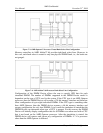
AMD Confidential
User Manual November 21
st
, 2008
Chapter 7: Device Configuration 65
7.4 Emerald Graphics Device
The Emerald graphics device provides an industry-standard PCI/AGP VGA-compatible
video device. The device provides a fully functional set of PCI configuration registers.
The AGP interface is currently somewhat minimal, and is not capable of generating AGP
cycles nor AGP-specific modes at this time.
The Emerald graphics device is comprised of a standard VGA and the Emerald Graphics
sub device. The graphics display engine automatically switches between the Emerald
Graphics sub device and the VGA as necessary to display the selected video modes, with
only one being able to display at a time. The VGA sub device provides an industry-
standard VGA interface used by BIOS and DOS. The Emerald Graphics device provides
an AGP and PCI graphics device interface controllable either by VESA BIOS extensions
or a video driver. In addition to the VGA standard modes, Emerald Graphics supports a
wide range of graphics modes from 320x200 at 16-bit color up to 2048x1536 at 32-bit
color with either the VESA BIOS extensions or a video driver.
Interfaces
The Emerald graphics device has both a PCI slot and an AGP bus connection, only one of
which can be used at any time to connect to PCI slots or AGP bus ports in other devices.
Initialization and Reset State
Upon initial creation, this device initializes the internal registers to VGA standard reset
state, and creates a display window that acts as the VGA display. The Configuration
options are initialized to enable both the VGA and Emerald Graphics. The frame-buffer
size is initialized to 16 Mbytes and the Bios File memory area is initialized to all ones.
A reset will re-load the default PCI configuration registers and place default values in the
Chip and FIFO configuration for the Emerald Graphics device.
Contents of a BSD
The data saved in the BSD depends on the mode the graphics controller was in when the
BSD was saved. If the graphics controller was in VGA mode, the BSD file contains the
contents of all VGA registers, a copy of the 256-Kbyte VGA frame buffer, and all
configuration information. If the graphics controller was in a high-resolution mode (non-
VGA in Windows) the frame buffer, Emerald Graphics registers, and PCI configuration
registers are saved in the BSD. When the BSD file is reloaded, all registers and the frame
buffer are restored, and a display image is captured and displayed in the display window.
Configuration Options
VGA Sub Device Configuration


















